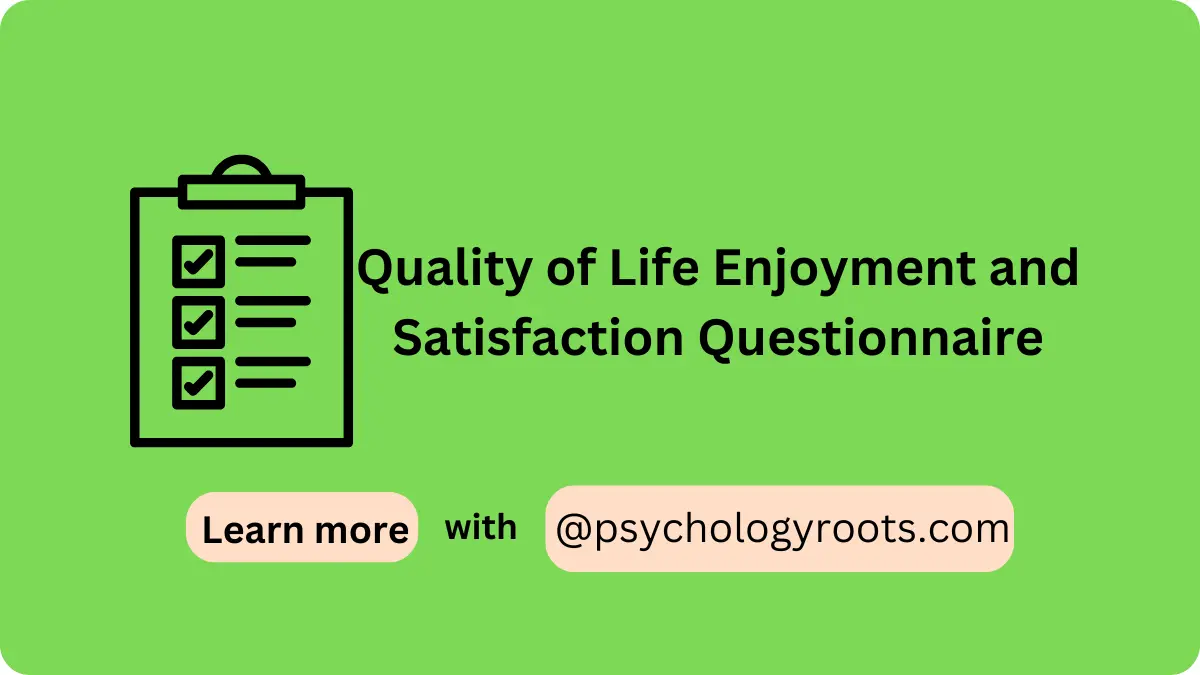Table of Contents
Quality of Life Enjoyment and Satisfaction Questionnaire
Here in this post, we are sharing the “Quality of Life Enjoyment and Satisfaction Questionnaire”. You can read psychometric and Author information. We have thousands of Scales and questionnaires in our collection (See Scales and Questionnaires). You can demand us any scale and questionnaires related to psychology through our community, and we will provide you with a short time. Keep visiting Psychology Roots.
About Quality of Life Enjoyment and Satisfaction Questionnaire
Scale Name
Quality of Life Enjoyment and Satisfaction Questionnaire
Author Details
Jean Endicott, John Nee, Wilma Harrison, and Roger Blumenthal
Translation Availability
English

Background/Description
The Quality of Life Enjoyment and Satisfaction Questionnaire (Q-LES-Q) is a comprehensive self-report instrument designed to assess an individual’s subjective enjoyment and satisfaction across various domains of daily life, with a focus on mental health and psychiatric populations. Developed in 1993 by Jean Endicott and colleagues, the Q-LES-Q was created to address the need for a reliable, multidimensional measure of quality of life that captures the positive aspects of functioning, rather than solely focusing on symptom severity. Initially validated in patients with depression, its utility has expanded to other conditions, including anxiety disorders, schizophrenia, and chronic medical illnesses, making it a versatile tool in clinical and research settings.
The Q-LES-Q consists of 93 items in its full form, with a widely used 16-item short form (Q-LES-Q-SF) for greater practicality. The short form covers key domains such as physical health, mood, work, social relationships, leisure activities, and overall well-being. Respondents rate each item on a 5-point Likert scale (1 = “not at all or never” to 5 = “frequently or all the time”) based on their experiences over the past week. Scores are typically expressed as a percentage of the maximum possible score, with higher percentages indicating greater life enjoyment and satisfaction. Its design emphasizes subjective well-being, making it sensitive to treatment effects and functional improvements.
Psychologists and clinicians value the Q-LES-Q for its ability to provide a holistic view of a patient’s quality of life, complementing symptom-focused assessments. It supports treatment planning, outcome evaluation, and patient-centered care, particularly for interventions like psychotherapy or pharmacotherapy. The scale’s translations enhance its global applicability, enabling professionals to assess and improve life satisfaction across diverse populations with empathy and precision.
Administration, Scoring and Interpretation
- Obtain a copy of the Quality of Life Enjoyment and Satisfaction Questionnaire (or its short form) from a reputable source, such as peer-reviewed journals or authorized research platforms, ensuring proper use permissions.
- Explain the purpose of the Q-LES-Q to the respondent, noting that it measures enjoyment and satisfaction in daily life to guide care or research, emphasizing its focus on positive experiences.
- Provide instructions, asking the respondent to rate each item (16 for the short form) based on their feelings and experiences over the past week, using the 1-5 scale, and to answer honestly.
- Approximate time for completion is about 5-10 minutes for the short form (15-20 minutes for the full form), depending on the respondent’s pace and comprehension.
- Administer the scale in a private, comfortable setting, using paper or digital formats, to promote candid and accurate responses.
Reliability and Validity
The Quality of Life Enjoyment and Satisfaction Questionnaire exhibits robust psychometric properties, supporting its use in clinical and research contexts. Internal consistency is excellent, with Cronbach’s alpha values of 0.90-0.96 for the full form and 0.85-0.90 for the short form, indicating strong item cohesion. Test-retest reliability is high, with correlations of 0.80-0.86 over one-week intervals in stable populations, reflecting consistent measurement of quality of life.
Convergent validity is evidenced by significant correlations with other quality of life measures, such as the Short Form-36 (SF-36) (r = 0.60-0.75) and the Satisfaction with Life Scale (r = 0.65-0.80). Discriminant validity is supported by weaker associations with symptom-focused scales, like the Hamilton Depression Rating Scale (r = 0.40-0.50), ensuring specificity to life satisfaction. Criterion validity is demonstrated by its ability to differentiate healthy individuals from those with psychiatric disorders and its sensitivity to treatment effects, such as improved scores post-antidepressant therapy or CBT. These qualities, as reported by Endicott et al. (1993), affirm the Q-LES-Q’s reliability and validity.
Available Versions
Multiple-Items
Reference
Endicott, J., Nee, J., Harrison, W., & Blumenthal, R. (1993). Quality of Life Enjoyment and Satisfaction Questionnaire: a new measure. Psychopharmacology bulletin, 29(2), 321-326.
Important Link
Scale File:
Frequently Asked Questions
What does the Q-LES-Q measure?
It measures subjective enjoyment and satisfaction across life domains.
Who can use the Q-LES-Q?
Clinicians, psychologists, and researchers assessing quality of life.
How long does the Q-LES-Q short form take to complete?
It takes about 5-10 minutes.
Is the Q-LES-Q specific to depression?
No, it’s used for various psychiatric and medical conditions.
Can the Q-LES-Q track treatment outcomes?
Yes, it’s sensitive to changes from therapy or medication.
Disclaimer
Please note that Psychology Roots does not have the right to grant permission for the use of any psychological scales or assessments listed on its website. To use any scale or assessment, you must obtain permission directly from the author or translator of the tool. Psychology Roots provides information about various tools and their administration procedures, but it is your responsibility to obtain proper permissions before using any scale or assessment. If you need further information about an author’s contact details, please submit a query to the Psychology Roots team.
Help Us Improve This Article
Have you discovered an inaccuracy? We put out great effort to give accurate and scientifically trustworthy information to our readers. Please notify us if you discover any typographical or grammatical errors.
Make a comment. We acknowledge and appreciate your efforts.
Share With Us
If you have any scale or any material related to psychology kindly share it with us at psychologyroots@gmail.com. We help others on behalf of you.